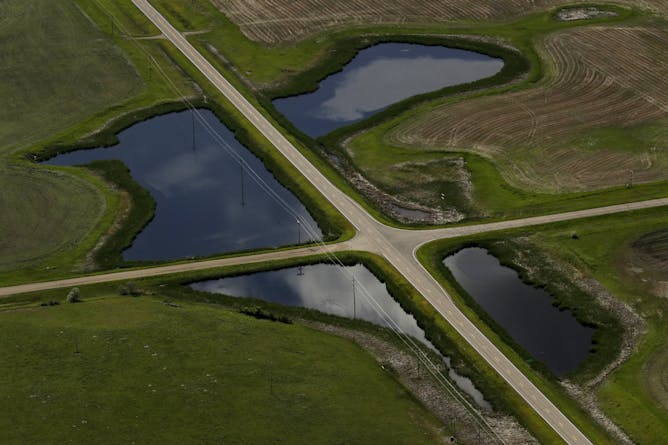|
Top headlines
Lead story
The United States has lost half of its wetlands since the Colonial era, according to a recent report from the U.S. Fish and Wildlife Service. Swamps and marshes are disappearing at an increasing rate, and the Supreme Court added to the pressure with a 2023 ruling that sharply cut back federal protection for them.
Environmental law scholars Steph Tai of the University of Wisconsin-Madison and Michael Vandenbergh of Vanderbilt University see hope in actions by private businesses, including banks, insurers and retailers that want to show their sustainable bona fides. By adding wetland protection to their investment decisions and supplier guidelines, Tai and Vandenbergh assert, private companies can help prevent these valuable ecosystems from being filled in or paved over.
[ Help us bring journalism written by experts to the public, without a paywall ]
|

Roads divide what once was a larger wetland into four smaller pools in east-central North Dakota.
AP Photo/Charlie Riedel
Steph Tai, University of Wisconsin-Madison; Michael Vandenbergh, Vanderbilt University
The Supreme Court drastically reduced federal protection for wetlands in 2023. Two environmental lawyers explain how private businesses and nongovernment organizations can help fill the gap.
|
Science + Technology
|
-
Lulu Zhao, University of Michigan
The Sun will be at its most explosive right around the time NASA plans to put people back on the Moon.
-
Zhengxing Li, University of California, San Diego
Green algae carry drug-loaded nanoparticles directly to the lungs, reducing side effects in other organs and increasing treatment efficiency.
-
Anne Toomey McKenna, University of Richmond
Secret recordings raise questions about Justice Alito’s impartiality, but they also reveal the weak state of legal protections against the misuse of the microphones and cameras everyone carries.
|
|
Politics + Society
|
-
Joseph Siev, University of Virginia; Richard Petty, The Ohio State University
The more ambivalent a person is about a political issue, the more likely they are to support violence and other extreme actions relating to that issue.
-
Nicolai N. Petro, University of Rhode Island
Recruiters are struggling to find enough men to counter a Russian invasion that has gained momentum in recent months.
-
Nicole Lee Schroeder, Kean University
Amid rising unemployment, inflation and poverty in the 1830s, Philadelphia taxpayers believed welfare scammers were bleeding coffers dry. Poor lists from 1829 show they were wrong.
|
|
Economy + Business
|
-
Christopher Decker, University of Nebraska Omaha
The Federal Reserve is being characteristically cautious.
|
|
Ethics + Religion
|
-
Anthony Siracusa, St. John Fisher University
Lawson learned in India how to resist racism and subsequently trained his students on the systematic use of nonviolence to fight injustice.
-
Robert Rosenberger, Georgia Institute of Technology
Anti-camping laws are the centerpiece of the ‘hostile design’ strategies cities use to push the unhoused out of public spaces.
|
|
Environment + Energy
|
-
John Weigand, Miami University
Turning excess office space into apartments isn’t a panacea for the housing shortage, but it’s producing thousands of new units yearly and is more sustainable and economical than new construction.
|
|
Podcast 🎙️
|
-
Gemma Ware, The Conversation
Astronomers Vicent Martínez and Bernard Jones explain the mystery of the Hubble tension, and why it matters so much for our understanding of the universe, on The Conversation Weekly podcast.
|
|